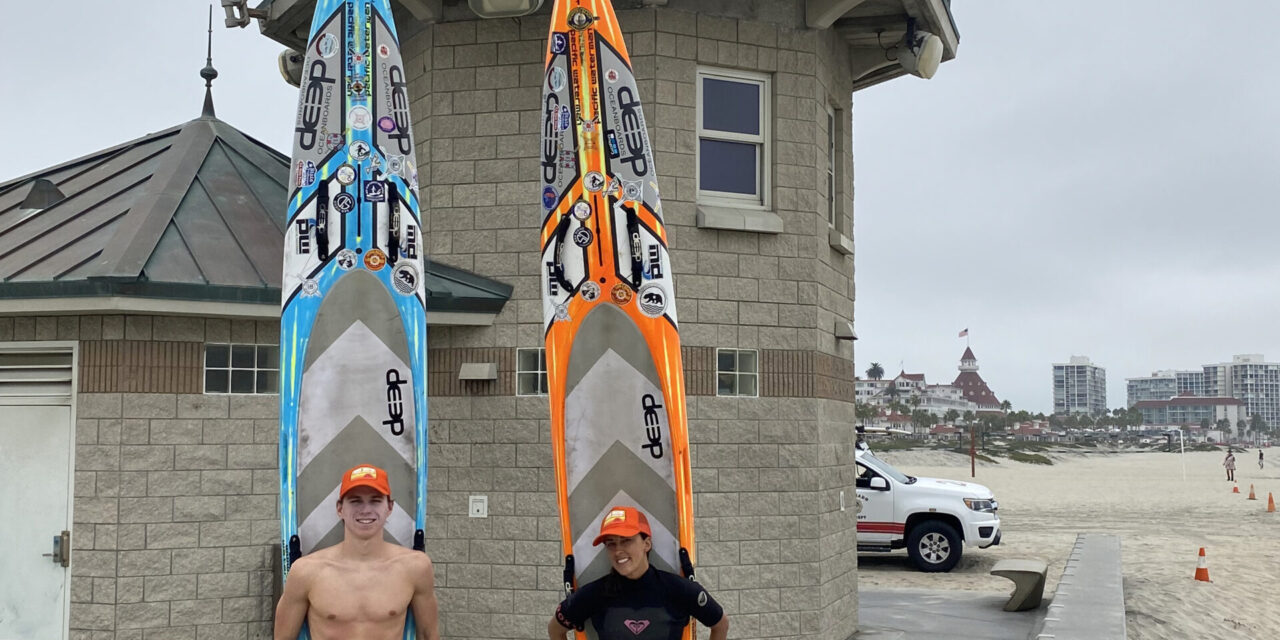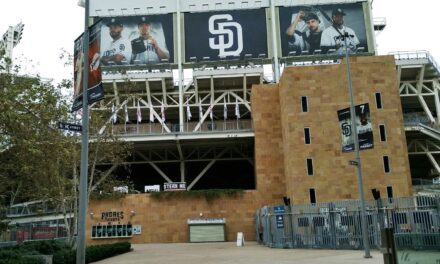
By SDCN Staff
Coronado, CA–The “SoCal PaddleDown for Cancer Relay” came ashore in Coronado on Oct. 7 concluding its months-long southbound journey.
A partnership between the John Wayne Cancer Foundation’s (JWFC) “Block the Blaze” initiative and the California Surf Lifesaving Association (CSLSA), the ocean paddle relay was developed to raise skin cancer awareness by featuring ocean lifeguards and junior lifeguards from over 25 lifeguard and marine safety agencies paddling the official “SoCal PaddleDown” paddle boards along the California coast through multiple lifeguard jurisdictions during the summer.
The final legs of the paddle were completed by San Diego City Ocean Lifeguards Louis White and Roger Eales paddling from Ocean Beach to the Point Loma LightHouse where the official paddle boards were handed off to Coronado Lifeguard Noah Griffith and Silver Strand State Beach Lifeguard Lisa Lane. The latter duo paddled to the southern tip of Silver Strand State Beach and by doing so concluded the relay for 2022.
The relay stopped just short of its intended goal of reaching the Mexico Border when it was halted in Coronado because the San Diego Department of Health issued a water quality warning for the ocean waters from the Mexico Border to Silver Strand. Adhering to lifeguard safety protocols and departmental policies, the relay was concluded approximately 5 miles short of its intended goal.
The 2022 250-mile “SoCal PaddleDown for Cancer Relay” began its journey on June 1, at Gaviota State Beach in Santa Barbara County with the intended goal of reaching the Mexico Border. Not counting the paddlers going in and out of the surf, the overall distance is actually farther.
Each leg featured a pair of lifeguard paddlers navigating custom designed 12’ prone Deep Ocean Boards paddleboards equipped with SPOT Gen 4 and Trace satellite GPS monitoring devices to track their progress. At least two paddlers are deployed because it is always safer to paddle with a buddy.
The “SoCal PaddleDown” was specifically established to help with community outreach of the JWCF “Block the Blaze” program which centers on early skin cancer prevention and recognition among those spending considerable time outdoors.
“As lifeguards, we spend the majority of our careers in the sun, and we know the dangers of sun exposure,” said Bill Humphreys, President of the CSLSA. “’The SoCal PaddleDown’ is a great way of raising awareness about the dangers of sun exposure, and the JWCF is providing the next generation of lifeguards the tools and information to prevent and detect skin cancer.”
In California, 1 in 3 residents will be diagnosed with skin cancer during their lifetime. Nearly all skin cancer is curable if caught early and treated quickly. Skin cancer is the most common cancer in the United States with nearly 4 million people diagnosed annually, according to the JWCF.
“Sun damage is cumulative, so the sooner we can provide lifesaving information to our youth, the better,” said Lauren Fraga, Senior Program Director of JWCF. “Each summer, nearly 25,000 junior lifeguards learn how to be sun safe through our “Block the Blaze” presentations, after which they are given sunscreen and a hat to immediately implement sun safety. We are grateful to the CSLSA for helping the JWCF promote sun safety.”
The “Block the Blaze” program is the official partner of the CSLSA to provide skin cancer education to junior lifeguards throughout California. To support this effort with donations please visit jwcf.org.
The program has educated over 100,000 junior lifeguards about sun safety and skin cancer with an emphasis on skin cancer prevention and screening. In addition to early detection and how recognizing the first signs of skin cancer, the program teaches the JGs how to protect themselves from harmful sun exposure.
The Junior Lifeguard Program is an ocean and beach safety program for youths ages 9-17. Participants receive education and experience in ocean safety, first aid, rescue techniques, body and board surfing, physical fitness, and Marine Safety operations.



